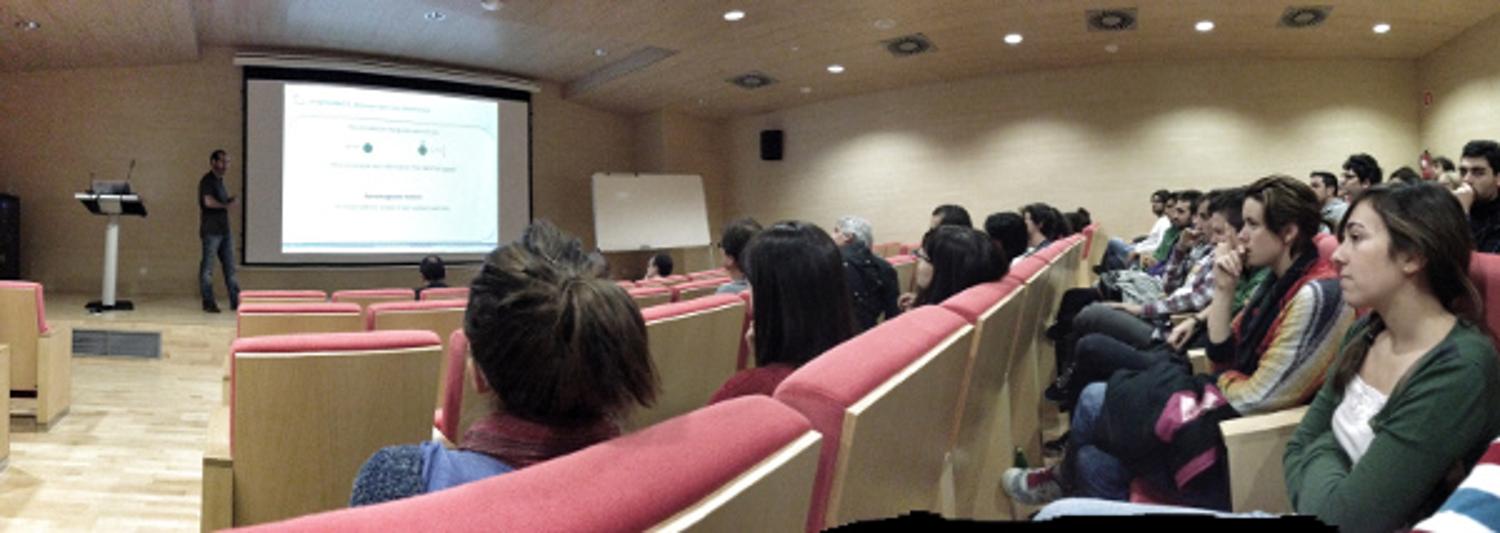“Spintronic devices based on fullerene C60”, PhD Thesis defended by Marco Gobbi
Marco Gobbi, Pre-doctoral researcher at the Nanodevices Group, got his Doctor Degree at the University of The Basque Country (UPV/EHU) after the defense of his thesis project on Friday 24 May 2013. His research work achieved the maximum qualification (cum laude) after the defense and assessment of his work by an international committee that included leading researchers in the field of nanodevices.

On Friday 24 May Marco Gobbi defended his thesis project “Spintronic devices based on fullerene C60” at the University of the Basque Country. This work has been developed during four years within the Nanodevices Groups of nanoGUNE, under the supervision of the Group Leader Luis Hueso.
The thesis describes the fabrication and characterization of spintronic devices based on the combination between thin films of ferromagnetic metals and C60 fullerene molecules. The work begins with an introduction to the field of spintronics, highlighting the reasons for which molecules are emerging as attractive materials for spintronic applications. In particular, the spin scattering mechanisms are very weak in carbon based materials, so that long spin lifetimes are expected. First, the experimental techniques used in the thesis are described and the characterization of the quality of the thin layers is presented, in terms of transport properties and surface roughness. Then, the thesis focus on two spintronic devices based on C60: spin valves and magnetic tunnel transistors. In spin valves, C60 thin layers are sandwiched between two ferromagnetic metals. The devices show a resistance change when the magnetization of the metals point parallel or antiparallel, demonstrating spin conservation across the C60 layer. The magnetic tunnel transistor has a more sophisticated structure, composed by metallic, insulating and semiconducting layers. In this case the variation of the resistance driven by the magnetic field is much greater than in the case of spin valve. The thesis concludes with the description of a device for more advanced study of spin transport in C60.
An international committee including leading researchers in the field was selected by the UPV/EHU to assess the research project:
- Jose Manuel Barandiaran (UPV/EHU, Spain)
- Jose Maria de Teresa (Universidad de Zaragoza, Spain)
- Sergio Valenzuela (Catalan Institute of Technology, Spain)
- Andreas Berger (nanoGUNE, Spain)
- Daniel Sanchez Portal (Center of Materials Physics-UPV/EHU, Spain)
The defense consisted of a presentation by the candidate of the main aspects of the research project followed by a long discussion about the questions that each one of the members of the committee raised around the research works that have been carried out during the whole PhD period. After its final deliberation, the committee decided to award the candidate the Doctor Degree with the highest mention existing at the Spanish University cum laude and congratulated both the new doctor and his supervisor for the high quality of the work done.
Marco Gobbi joined the Nanodevices Group in 2009, just after the official opening of nanoGUNE’s facilities in January 2009.
